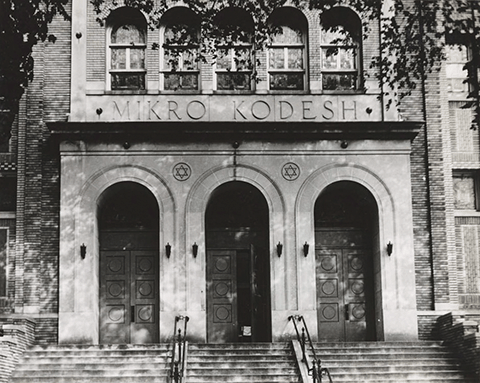By ELANA WARREN / Assistant Editor
The Disciples Ministry Church building, previously Mikro Kodesh synagogue, has been a part of the North Minneapolis neighborhood, at 1000 Oliver Ave., for almost 100 years. It is now up for sale, listed at $5,400,000.
Russian immigrants started the Orthodox congregation (at the time called Anshei Russia, Men of Russia) in 1890, on Oak Lake Avenue. They renamed it Mikro Kodesh in 1895 to disassociate from Russia. Then, according to a 1927 issue of the Jewish World, the Mikro Kodesh synagogue on Oliver was built in 1926 and dedicated in 1927. A community building was added on in 1949.

Mikro Kodesh had the largest Orthodox congregation in Minneapolis in 1967, even though over 60 percent of its members had moved away from the North Side. But by 1969, the congregation was down to 500 members, from 500 families in 1967.
As racial conflicts arose, migratory trends changed and Jews continued to move westward, some synagogues relocated. The Mikro Kodesh congregation merged with Tifereth B’nai Jacob, in 1969, and then also with B’nai Abraham, a Conservative congregation, in 1972. As B’nai Emet, the unified congregations moved to St. Louis Park. Finally in 2011, B’nai Emet joined Adath Jeshurun Congregation in Minnetonka.
Yet the building in North Minneapolis still stands, though renovated. It was vacant for a decade after the Mikro Kodesh congregation left, and then it became the Disciples Ministry Church.
The building’s history as both a synagogue and a church is apparent from the front facade alone, with the words “Mikro Kodesh” and “Holy Assembly of the Sephardic People,” in Hebrew, as well as lions and the ten commandments representing its Jewish roots. But on top of the domes, between Stars of David, are crosses.
Under the leadership of Pastor Paul Arnopoulos, the church provided meals for those in need until 2012. Arnopoulos died in 2020, and his wife, Jeanine Arnopoulos, is now selling the building. She is also the realtor.
Prior to listing the property, Jeanine Arnopoulos looked into using it as a community resource building but could not find a developer to partner with on the project. It’s unknown what the future owner of the building will do with it, but its status as a Minneapolis local landmark means any changes — from minor alterations to demolition — must be approved by the Minneapolis Heritage Preservation Commission. Demolition can only be approved if it is necessary for safety and there are no reasonable alternatives.
While the building served as a church most recently, it has held the Minneapolis local landmark status as a synagogue since 1998. It is an example of the religious and cultural development of the city as well as physical evidence of a once booming Jewish community in North Minneapolis.
Local historian Laura Weber wrote for the journal Minnesota History: “The Moorish/Byzantine-style building, home to the congregation Mikro Kodesh (Holy Assembly), is one of the few physical remnants of the now-dispersed North Side Jewish community. This was a place where grandparents, aunts, and cousins lived on the next block, and numerous delis, kosher butcher shops and groceries were around the corner. There were so many synagogues that groups of teenagers could walk from one to another on high holidays, socializing with friends.”
(American Jewish World, June 2024)



















